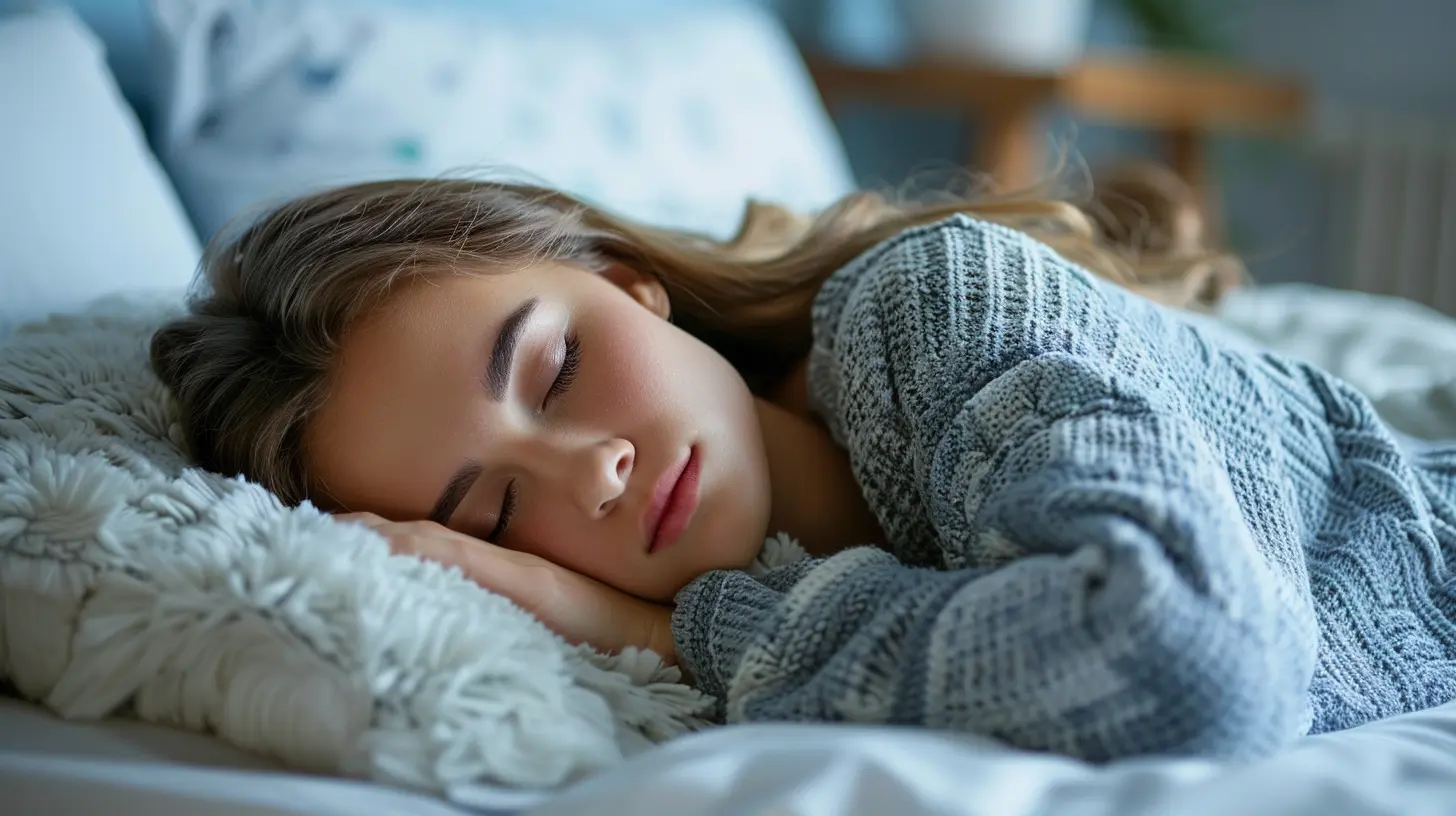Sleep and Its Role in Weight Loss
21 June 2025
Let’s be honest—we’ve all been there. You’ve counted calories, hit every gym session, swapped chips for kale, and still, that stubborn scale just won’t budge. What gives? What if I told you the real weight loss magic might be happening while you're asleep? Yep, you read that right. Sleep, that glorious act of doing absolutely nothing, plays a major role in your body's ability to manage weight. And trust me, hitting that snooze button might just be your new secret weapon.

Wait, Sleep Affects Weight Loss?
Absolutely! Sleep isn’t just downtime for your body. It’s actually prime time for some serious internal maintenance. Think of it as your body’s overnight cleaning crew—scrubbing away inflammation, balancing hormones, repairing muscle tissue, and yes, even influencing fat burning.Let me put it this way: trying to lose weight without enough sleep is like trying to drive a car with no gas. You can push it down the hill, sure, but eventually, you’re gonna stall.

The Science-y Stuff (But Not Too Nerdy, Promise)
When you sleep, your body regulates two key hormones: ghrelin and leptin.- Ghrelin is your "I'm hungry" hormone.
- Leptin is your "I'm full" hormone.
Guess what happens when you skimp on sleep? Ghrelin levels go up, and leptin levels tank. Suddenly, your body thinks it’s in survival mode and starts screaming, “Feed me all the carbs, NOW!” This hormonal mayhem translates to late-night cravings, mindless snacking, and a tendency to overeat.
Oh, and there’s more. Lack of sleep messes with insulin sensitivity. That’s the hormone that helps your cells absorb glucose from the bloodstream. When you’re sleep-deprived, your body becomes insulin-resistant. Translation: your body stores more fat.

Cranky, Tired, and More Likely to Skip Your Workout
Be honest—how likely are you to crush a spin class after a sleepless night? Not very, right?When you're sleep-deprived, you're more fatigued, irritable, and less motivated. Exercise? Cooking a healthy dinner? Forget it. You’re more likely to hit the couch with takeout and binge-watch a show until midnight.
Sleep loss also affects your decision-making and impulse control. Your prefrontal cortex (the rational, decision-making part of your brain) gets foggy, while your amygdala (the emotional side) gets extra fired up. That’s why you're more likely to reach for a donut than a salad when you’re running on fumes.

So, How Much Sleep Is Enough?
Good question! Most adults need between 7 to 9 hours of quality sleep each night. Yep, quality matters just as much as quantity. If you’re tossing and turning or waking up every hour, those eight hours might not be doing much good.Here’s a quick cheat sheet:
| Age Group | Recommended Hours of Sleep |
|------------------|----------------------------|
| Adults (18-64) | 7–9 hours |
| Older Adults (65+) | 7–8 hours |
If you're consistently getting less than 7 hours, your body is probably operating in “energy-saving” mode—which basically means it’s clinging to fat like a toddler holding onto their favorite toy.
The Sleep-Weight Loss Connection: Real-Life Proof
Still not convinced? Let’s talk studies.One study published in the Annals of Internal Medicine showed that people trying to lose weight who slept 8.5 hours per night lost more than twice as much fat as those who slept only 5.5 hours, even when both groups consumed the same number of calories.
Another study in the journal Sleep found that short sleepers were 55% more likely to become obese. That’s not a typo. Fifty-five percent!
Sleeping well helps regulate your metabolism, keeps those hunger hormones in check, and boosts your energy so you actually feel like working out and making good food choices. It’s kind of a big deal.
Best Sleep Habits for Weight Loss
Okay, okay—you’re convinced now. But how do you actually get better sleep? Don’t worry, I’ve got your back.1. Stick to a Sleep Schedule
Go to bed and wake up at the same time every day—even on weekends. Your body thrives on routine. Think of it like training a puppy. A predictable sleep schedule helps regulate your internal clock and improves the quality of your snooze sessions.2. Create a Wind-Down Routine
Turn off screens at least an hour before bed (yes, even TikTok), take a warm bath, read a real book, journal your thoughts, or try some relaxing stretches. Doing the same calming thing every night signals to your body that it’s time to power down.3. Watch What You Eat (and Drink)
Caffeine after 2 PM? Nope. Heavy meals late at night? Also nope. Try to stop eating 2–3 hours before bedtime. Spicy, sugary, or fatty foods may cause indigestion or disturb your sleep.Oh, and alcohol? It might knock you out quicker, but it actually messes with your sleep cycle, causing more nighttime wake-ups. You’ll feel groggy, not refreshed.
4. Make Your Bedroom a Sleep Sanctuary
Cool room? Check. Blackout curtains? Check. Cozy pillows and a mattress that doesn’t feel like a rock? Double check. Your sleep environment should be cool, dark, quiet, and comfy. Make it your oasis.Bonus tip: If you can, ban electronics from the bedroom. The blue light tricks your brain into thinking it’s still daytime. No bueno.
5. Move Your Body During the Day
Exercise boosts melatonin production, reduces stress, and helps you fall asleep faster. Aim for at least 30 minutes of moderate activity most days. Just don’t work out right before bed—it might leave you too wired to drift off.Struggling to Sleep? You’re Not Alone
If you’re doing all the right things and still tossing and turning, don’t beat yourself up. Sleep can be complicated. Stress, anxiety, underlying health issues—these all play a part.Here are a few extra tips:
- Try natural sleep aids like magnesium, valerian root, or chamomile tea (but always check with your doctor).
- Mindfulness meditation or breathing exercises can calm your brain.
- Cognitive behavioral therapy for insomnia (CBT-I) is a proven and drug-free approach to better sleep.
And hey, don’t underestimate the power of seeing a sleep specialist. If sleep apnea or another condition is stealing your ZZZs, they can help.
Let’s Tie It All Together
So, can sleeping more help you lose weight?Absolutely—without a doubt.
Sleep is the unsung hero of the weight loss journey. It keeps your hormones happy, your metabolism humming, and your cravings in check. It gives you the energy to crush your workouts and the clarity to make smarter food choices.
Think of sleep as permission to rest, recharge, and rewire your body. Treat it like your next best workout or your clean eating plan—because it’s just that important.
A Final Pep Talk
Look, weight loss is never a one-size-fits-all thing. It’s messy, personal, and sometimes just downright frustrating. But if you've hit a wall, and you’re doing “everything right,” maybe it’s time to stop looking at your plate and gym schedule—and start looking at your pillow.Get your sleep game on point, and your body will thank you in more ways than one.
So tonight, give yourself permission to put the phone down, curl up, and drift off guilt-free. You’re not just getting rest—you’re putting in some serious (and much-deserved) fat-burning, energy-boosting, goal-crushing work. All while dreaming of your best, healthiest self.
Sleep on it—you’ve got this.
all images in this post were generated using AI tools
Category:
Weight LossAuthor:

Sophia Wyatt
Discussion
rate this article
2 comments
Thalwen Love
This article effectively highlights the crucial connection between sleep and weight loss, emphasizing how inadequate rest can disrupt metabolism and increase cravings. By prioritizing quality sleep, individuals can enhance their weight management efforts, supporting overall health and well-being.
June 23, 2025 at 4:27 AM

Sophia Wyatt
Thank you for your insightful comment! I'm glad you found the connection between sleep and weight loss so compelling. Prioritizing quality sleep is indeed essential for effective weight management and overall health.
Cecilia Rocha
Sleep: the magical weight loss potion that’s calorie-free and comes with zero gym memberships—just sweet, sweet dreams!
June 22, 2025 at 3:38 PM

Sophia Wyatt
Absolutely! Quality sleep is crucial for weight management, as it helps regulate hormones that control appetite and metabolism. Sweet dreams indeed play a vital role in achieving weight loss goals!


